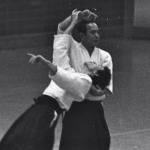 Aikido is a non-violent, non-competitive martial art based on harmonizing with and redirecting an opponent’s force. It can be practised by people of all ages, bringing greater well-being, health and vitality to those who practise it.
Aikido is a non-violent, non-competitive martial art based on harmonizing with and redirecting an opponent’s force. It can be practised by people of all ages, bringing greater well-being, health and vitality to those who practise it.
Shin Shin Toitsu Aikido, founded by Koichi Tohei, places special emphasis on the role of Ki in Aikido. In addition to Aikido, it offers ways to cultivate Ki through Ki breathing, misogi, meditation and kiatsu.
The word Aikido in Japanese kanji allows for several interpretations, but can be loosely translated as “The Way of Harmony” or “The Way of Union with Ki”. Ki is a common term in Japan and is used in many contexts, but here it stands for the natural life force that is within us and in all things. Everything has Ki, thus to be one with Ki is to be one with all things.
Aikido practice is a way for us to achieve this unity. We learn to let go of our conflict-based thinking when interacting with others and to act from a place of calm, relaxation, and non-dissension. Since Ki is a natural and dynamic force already present in all of us, we can learn to cultivate it and develop a vitality by which we and our partner move together as one. In Aikido, the force of an attack is not met with resistance; it is redirected such that the potential for injury – for both ourselves and the attacker – is neutralized. This is usually achieved through throws and pins, but above all we must learn to know and respect our opponent’s mind while moving with our own mind and body coordinated. Only through a calm, relaxed, centered mind can we correctly move ourselves and see others clearly. When we act in a spirit of conflict, our mind and body become separated. We try to physically resist an attacker’s force while our mind fixates on what to do next. With mind and body unified, we remain in the present moment, and we are in harmony with Ki. When we move ourselves in this way, respecting the attacker’s intention, the latter cannot help but follow.
Practitioners are often surprised at how an opponent’s physical strength is easily overcome by a relaxed, coordinated mind and body. This principle applies not only to Aikido techniques but also to our interactions with people in everyday life. Through Ki development we become more at ease in any situation, more responsive, compassionate, and spontaneous. Ki development lies at the core of Aikido, and can also be practised independently of Aikido, regardless of one’s age or physical condition.
Koichi Tohei Sensei, the founder of Shin Shin Toitsu Aikido (Aikido with Mind and Body Unified), developed a system for achieving Mind and Body Coordination. This system is embodied in the Four Basic Principles:
- Keep One Point.
- Relax Completely.
- Keep Weight Underside.
- Extend Ki.
Keeping One Point means calming and focusing the mind at a point in the lower abdomen. This creates an immediate increase in balance and stability. Aikido offers several simple tests to measure a person’s ability to keep One Point.
Relaxing completely means releasing all stress, not only from the body but from the mind as well. A calm mind leads to a calm body. This in turn allows for greater mobility.
Keeping weight underside means letting the weight of every part of the body settle at its lowest point. It is very difficult to lift a person having weight underside. Conversely, if a person is lost in thought or stress causes their shoulders to rise, they will have weight upperside and will be much easier to lift. This can be verified easily.
Extending Ki, sometimes translated as “Ki is extended”, means projecting one’s feeling with a positive, open mind. It is a natural state that we can relax into and does not imply some special force. One of the key lessons Koichi Tohei learned from his teacher, Master Tempu Nakamura, was that “Mind leads the Body”. Projecting one’s feeling is really extending the mind such that our body’s motion becomes fully connected to it.
It is often said in Aikido that if one is properly doing one of these principles, then one is doing all four.
Further reading: Koichi Tohei – Ki Society
